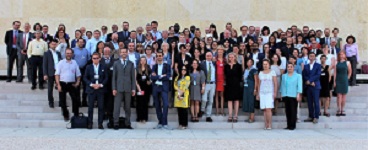 Since its adoption in 1998, the UNECE Convention on Access to Information, Public Participation in Decision-making and Access to Justice in Environmental Matters (Aarhus Convention) has been a model for application of the concept of environmental democracy as enshrined in Principle 10 of the Rio Declaration on Environment and Development.
Since its adoption in 1998, the UNECE Convention on Access to Information, Public Participation in Decision-making and Access to Justice in Environmental Matters (Aarhus Convention) has been a model for application of the concept of environmental democracy as enshrined in Principle 10 of the Rio Declaration on Environment and Development. The twentieth anniversary of the adoption of the Convention was commemorated at a special segment of the twenty-second meeting of the Working Group of the Parties to the Aarhus Convention, held at the Palais des Nations in Geneva from 19 to 21 June 2018.
In an emotional anniversary celebration, key past and present players, including Government representatives, experts involved in the negotiation of the Convention, non-governmental organizations (NGOs) and other stakeholders shared personal memories from the Convention’s early days and subsequent implementation and spoke about its regional and global significance today.
These “Aarhus stories” demonstrated the visionary approach that was taken during the negotiations and makes the Convention still relevant today, 20 years after its adoption. The Convention opened doors for civil society to play a role in decision-making; in fact, the Convention has become a tool for democracy in the vast majority of countries across the pan-European region, regardless of their socioeconomic development or political system.
The participants’ stories also showed how people can make a difference: the contribution of some individuals during the negotiations was a key factor in their success and led to the adoption of the treaty that we have today. Other stories illustrated the way in which national courts and the European Court of Justice became important drivers of the Convention’s implementation and contributed significantly to the development of environmental and human rights law.
The celebration served as a reminder of the importance of democratic values at a time when many societies are moving away from them. Shrinking democratic spaces in which governments limit the operation of civil society organizations while persecuting and harassing environmental activists are becoming increasing common. It is crucial that people be able to exercise their environmental rights without fear.
The participants emphasized that technology has changed over the past 20 years and that digitization and new platforms should be used more effectively in implementing the Convention, particularly in view of its pillar on access to information.
The need to involve young people more systematically in environmental decision-making in support of the Convention’s vision of creating a sustainable future was recognized during the session on Youth, Aarhus and the Sustainable Development Goals.
In a statement made on the occasion of the celebration, UNECE Executive Secretary Olga Algayerova said: “Twenty years after its adoption, the Aarhus Convention remains an effective instrument for the promotion of environmental democracy. The growing interest in the Convention’s model in countries around the world underscores the significance of democratic values for our societies and for sustainable development more broadly. I commend the strong commitment of Parties, NGOs, judiciary and other stakeholders to promoting transparency, effective public participation and the rule of law, which are critical for delivering on the 2030 Agenda for Sustainable Development. UNECE is proud to service this agreement and stands ready to share its experience gained in over 20 years with other regions and organizations”.
For more information, please visit: http://www.unece.org/index.php?id=47188
Note to editors
The Aarhus Convention was adopted in Aarhus, Denmark, in June 1998 and entered into force in October 2001.
The Parties to the Convention include the European Union, the vast majority of countries in Eastern Europe and Central Asia, all of the countries in the Caucasus and South-Eastern and Northern Europe, and all of the European Union’s member States.

